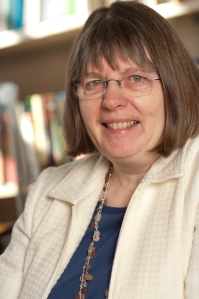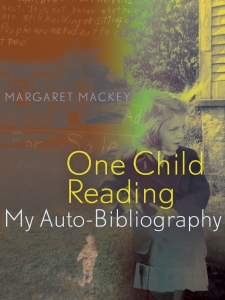 Margaret Mackey
Margaret Mackey
What is your latest release and what genre is it? One Child Reading: My Auto-Bibliography / nonfiction
Quick description: “The miracle of the preserved word, in whatever medium—print, audio text, video recording, digital exchange—means that it may transfer into new times and new places.” — From the Introduction
Margaret Mackey draws together memory, textual criticism, social analysis, and reading theory in an extraordinary act of self-study. In One Child Reading, she makes a singular contribution to our understanding of reading and literacy development. Seeking a deeper sense of what happens when we read, Mackey revisited the texts she read, viewed, listened to, and wrote as she became literate in the 1950s and 1960s in St. John’s, Newfoundland. This tremendous sweep of reading included school texts, knitting patterns, musical scores, and games, as well as hundreds of books. The result is not a memoir, but rather a deftly theorized exploration of how a reader is constructed. One Child Reading is an essential book for librarians, classroom teachers, those involved in literacy development in both scholarly and practical ways, and all serious readers.

Brief biography:
Margaret Mackey is Professor in the School of Library and Information Studies at the University of Alberta. She has published widely on the subject of young people’s reading and their multimedia and digital literacies. A voracious reader, she lives in Edmonton.
Links to buy Margaret’s book:
University of Alberta Press
Amazon
Margaret’s promo links:
Website
What are you working on now?
University of Alberta Press
What are you working on now?
At this moment (apart from moving house and closing my office), I’m just getting started on a project that has the potential to be very intriguing. In the fall I will be recruiting some undergraduates to create a digital map for me of a place that was very important to their early literacy. It can be a real-life landscape or a fictional one (acknowledging that some urban children don’t spend much time out of doors). I will invite them to annotate their map with any kind of records they can come up with – written comments, photographs, videos, audio, interactive ways to “travel” around the landscape, and anything else they can think of. I’ll interview them about the map: why they chose this landscape, what makes the annotations meaningful to them, what they remember more broadly about their literate lives at the time this map was meaningful to them. Pilot work has established that this method of approach can bring out expanded memories of an important stage in developing literacy; and while it is a tool to help articulate these memories, it also allows for some very eloquent forms of expression in its own right. I’m excited to get going on the full-stage project. The idea arose from the work I did for One Child Reading; I was very surprised to re-discover how important my own landscape had been to me and I began to wonder if it was the same for other readers. The pilot work suggests that the answer is yes.
Margaret’s reading recommendation:
I am very happy to recommend a wonderful book called Lakeland: Journeys into the Soul of Canada. It’s by Allan Casey and was published in 2009. Casey talks about the huge significance of lakes to many, many Canadian psyches. He begins with his “own” lake in Saskatchewan and visits at least one lake in every province except PEI. Some of these are working lakes, others are cottage country lakes, and some are just wild. I haven’t been to every lake he mentions but I’ve been to a number of them, and I’ve also driven across Canada three times, which certainly gives anyone a strong sense of what a lake-bound country this is. I don’t think you would need this level of experience to enjoy the book, but it would certainly help a reader if they loved at least one lake, wherever it is.